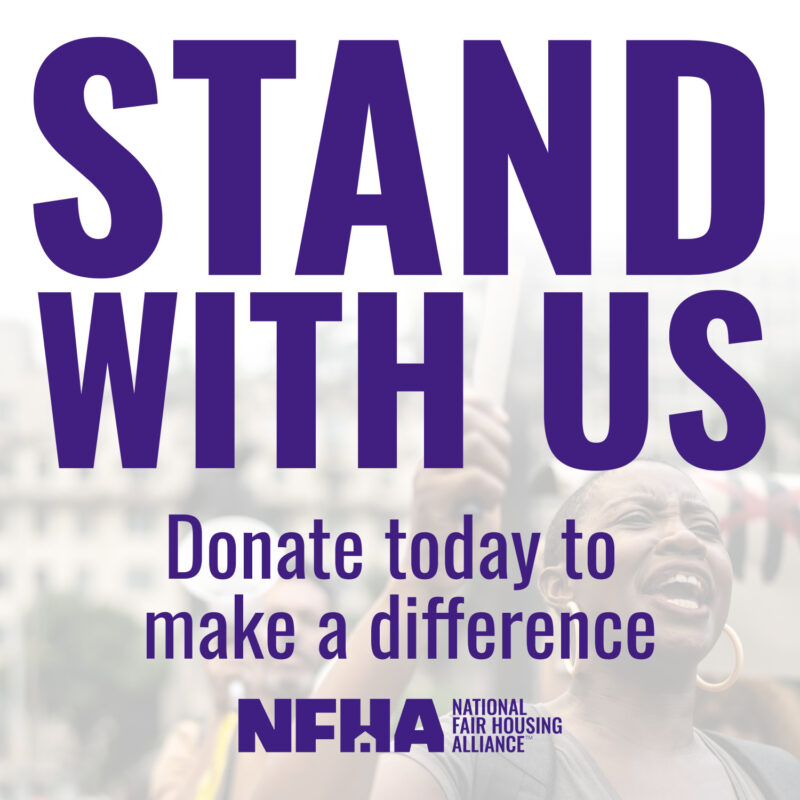National Fair Housing Alliance Reaches Settlement with Independence Place of Charlotte, Inc. in Familial Status Housing Discrimination Complaint
FOR IMMEDIATE RELEASE
June 5, 2020
Contact: Izzy Woodruff | 202-898-1661 | IWoodruff@nationalfairhousing.org
National Fair Housing Alliance Reaches Settlement with Independence Place of Charlotte, Inc. in Familial Status Housing Discrimination Complaint
Washington, D.C. — Today the National Fair Housing Alliance (NFHA) announced a settlement agreement with Independence Place of Charlotte, Inc., that will increase housing assistance funds available to low-income families in the Charlotte-Mecklenburg area.
As part of the agreement, Independence Place of Charlotte, which owns more than 165 apartments in Charlotte, N.C., will also conduct fair housing training and discontinue policies that directly discriminate or inadvertently result in discrimination against families with children.
“Amid the COVID-19 pandemic, there’s been an uptick in complaints of housing discrimination against families with children. It’s more important than ever that, as schools remain closed and children and parents are urged to stay home, we fight to combat housing discrimination,” said NFHA’s President and CEO, Lisa Rice.
In January 2019, while conducting fair housing training in the Charlotte-Mecklenburg area, NFHA staff received a complaint that Independence Place of Charlotte advertised and operated as an adults-only community. The company’s website stated that it was “a multi-professional adult living community” and that occupants must be “30 years or older.” Over the course of an ensuing six-month investigation, NFHA uncovered additional evidence that Independence Place of Charlotte enforced—verbally and in writing—age-based policies that resulted in familial status discrimination. In one instance, a tester with a child contacted the company to inquire about renting apartments and was told, “We don’t allow kids to stay on the premises.” The most recent incident of discrimination occurred on July 3, 2019.
The agreement announced today stems from an investigation using fair housing testers and a subsequent complaint filed by NFHA. The complaint alleged that Independence Place of Charlotte enforced a policy that prohibited any occupant under the age of 18 in its properties, in violation of the federal Fair Housing Act, the North Carolina Fair Housing Act, and the Charlotte Fair Housing Ordinance. In December 2019, the Charlotte-Mecklenburg Community Relations Committee issued a determination that there was reasonable cause to believe that Independence Place of Charlotte limited the housing choices of families with children in violation of local law.
In resolution of NFHA’s housing discrimination complaint, Independence Place of Charlotte agreed to pay $70,000 to NFHA for damages, costs, and fees and to provide $27,000 in grants, which NFHA will distribute to nonprofits that provide housing assistance to low-income families in the Charlotte-Mecklenburg area. The company also agreed to evaluate all future rental applicants without consideration of familial status; conduct fair housing training for staff and the public; prominently display equal housing signs, flyers, and brochures; and publish NFHA-approved housing advertisements.
“The provisions of this settlement will benefit vulnerable families throughout the Charlotte-Mecklenburg community who are struggling the most under the ongoing COVID-19 crisis,” Rice said. “This agreement sends a clear message to property owners and managers across North Carolina and nationwide that discrimination against families with children, whether intentional or not, will not be tolerated.”
NFHA’s work was made possible in part through a grant from the U.S. Department of Housing and Urban Development.
###
About The National Fair Housing Alliance
Founded in 1988, NFHA is a consortium of more than 200 nonprofit fair housing organizations, state and local civil rights agencies, and individuals from throughout the United States. Headquartered in Washington, D.C., NFHA works to eliminate housing discrimination and ensure equal housing opportunity for all people through leadership, education, outreach, membership services, public policy initiatives, community development, advocacy, and enforcement.
